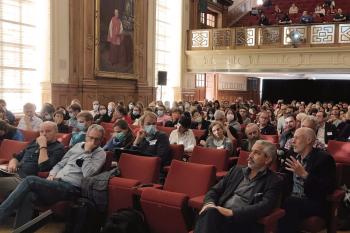It has been a tremendous pleasure to welcome 421 attendees (181 online and 240 in-person) in Leuven this week for two days of engaging science at New Horizons in Alzheimer’s Disease.
With the covid pandemic still raging across the globe, we had to be flexible with the organization of New Horizons in Alzheimer’s Disease - NHAD21. A few of the 23 invited and 13 selected speakers were forced to cancel their trip last minute, but with the virtual set-up and hybrid concept, this did not affect the vibrant discussions both online and in Leuven.
In four sessions, we zoomed in on genes and environment, synapse and circuitry, seeds and spreading of disease, and finally mechanisms and models of disease. To top it all off, Roger M Nitsch, inventor of aducanumab and CEO of Neurimmune, gave a keynote lecture, shedding some light on the controversial FDA approval of the latest Alzheimer’s drug.
You can find some photos of the event here.

NHAD21 Impressions by the conference reporters
During the conference our three conference reporters live-tweeted about the proceedings, which you can read on Twitter here. Here are their final thoughts on their experiences at the meeting.
Liesbeth Aerts, science communicator at VIB - @Liesbeth_Aerts
“I am pretty sure all of the nearly 250 attendees in Leuven went home with new inspiration after two full days packed with engaging sessions. The hybrid format was a real success: nearly 200 virtual attendees; plus, the show could go on as planned after a few speakers faced last-minute travel restrictions due to covid. As a science communicator, I was especially keen to see a full theatre for the keynote talk by Roger M Nitsch. In addition to the actual conference delegates, many members of the public joined in to learn more about what is on the horizon for them. After all, that is what this meeting is all about: advancing science to find new ways to prevent or treat Alzheimer’s disease.”
Sarah Borrie, postdoc VIB-KU Leuven Center for Brain & Disease Research - @sborrie
“It was refreshing to see that studying neurodegeneration in context was a big theme and is receiving a lot of attention in the field. A lot of super interesting work is happening in this area, from studying genetic risk in context and getting cell-based models to mimic in vivo states, to the role of the gut-brain axis in Alzheimer's disease. And as always, much debate about the role of neuroinflammation and microglia. It sparked lots of interesting discussions that were, finally, mostly in person!”
Lien Van Hoecke, postdoc VIB-UGent Center for Inflammation Research - @HoeckeLien
“Just before SARS-CoV2 took over the world I finished my PhD and made the shift from the onco-immunotherapy field to the field of neurodegenerative diseases. During lock-down it was much harder to connect with the scientists from the Alzheimer’s field, so I was thrilled to join my first in-person Alzheimer’s congress to connect with pioneering Alzheimer’s researchers from around the world. It was a meeting full of inspiring scientists and fascinating talks that filled my head with new ideas and challenges. I’m excited to go back to the lab with all these new insights and hopefully present our research results in the next NHAD meeting.”


Alzheimer Research Foundation awards two upcoming scientists with the SAO Poster Prize
Stichting Alzheimer Research / Alzheimer Research Foundation was one of the key sponsors of this event. They offered 12 travel grants and sponsored two poster prizes. With 120 posters the review team had their hands full with talking to all the poster presenters. Lead reviewer Wim Annaert remarked on the overall quality of all the presentations, but did make a selection of two who stood out.
Ana Raquel Melo de Farias (of Univ. Lille, Inserm, CHU Lille, Institut Pasteur de Lille, U1167, FR) was one of the winners with her research on "Role of PTK2B as a late-onset Alzheimer's Disease risk gene in the electrical activity of hiPSC-derived neurons". The other winner was the online participant Yun-Ru Chen (of Academia Sinica/ Genomics Research Center, TW) with his research on "TDP-43 interacts with amyloid-β, inhibits fibrillization, and worsens pathology in a model of Alzheimer’s disease".
New possibilities for science and patients who suffer from Alzheimer's Disease
During the closing remarks co-organizer Bart De Strooper looked at where AD research came from and where it's headed.
"There is a lot of exciting research happening. I think that the excitement is similar to what happened between 1990 and 1999, where there was really an explosion of knowledge. That was the time where we started to believe that Alzheimer's could be solved. Then we had a period where all the trials failed and all the hypotheses and ideas were under attack.
But now that we're in 2020 I have the impression that we really are going into the next decade with new biomarkers and a better understanding of this disease. And also an understanding that this is a complex disease with many different mechanisms and pathways. It opens new possibilities for not only exciting science and more importantly to identify targets and help the patients who suffer from this disease."
After two intense days of talks, discussions, networking and socializing we wrap up this first edition. But the recent rapid advances are bringing a new horizon of Alzheimer's Disease research into view and we can't wait to show you what's possible at the next VIB Neuroscience conference!